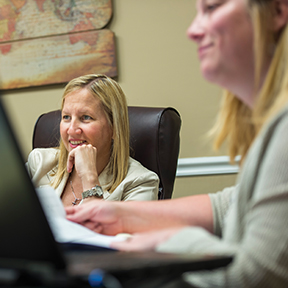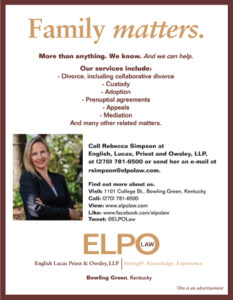
by Rebecca Simpson
Since I first wrote about collaborative family practice last year, the concept has continued to gain momentum among legal, financial and mental health professionals in our community. Many of us who work in family law are glad to see this as the collaborative process provides an option for families who want to maintain privacy, resolve their case respectfully and efficiently, and avoid court.
If you’re not familiar with collaborative family practice, it is a process that allows separating families to work with attorneys, financial professionals, therapists and other needed experts who help develop a plan that resolves issues without going to court.
Collaborative practice is substantially different from the court process that most people associate with divorce. The traditional litigation process can seriously undermine communication and cooperation between family members. Also, due to the public nature of most family court proceedings, the privacy of families before the court is compromised, and depending on the complexity of the issues involved, the process can take months or even years.
COLLABORATIVE PRACTICE IS GAINING GROUND
Collaborative family practice has been an emerging area of family law in Kentucky, across the U.S. and internationally for more than two decades. Within the past year, this approach to resolving family disputes has gained a lot of attention in Kentucky.
In February, our local bar association, in conjunction with Wilson Counseling, sponsored a free seminar presented by the Middle Tennessee Collaborative Alliance which provided a brief overview of the collaborative process. The response was overwhelmingly positive with more than 60 professionals attending to learn more about the collaborative process.
In June, I was a member of a panel presentation on collaborative practice at the Kentucky Bar Association convention, and at the upcoming Kentucky Law Updates across the state, collaborative practice will be included in a panel discussion presented by the Alternative Dispute Resolution section addressing what is happening in ADR across the state.
The popularity of these workshops reflects how collaborative methods of resolving family disputes are emerging as a new, and arguably better, approach to helping fractured families. Professionals are working together to transform the way we help families resolve disputes in a more respectful manner to help prevent unnecessary damage to family relationships that will remain ongoing long after a divorce or custody case is over.
UPCOMING TRAINING
To enable more professionals to gain the credentials required to join the community of collaborative practice professionals, we are bringing a two-day workshop on collaborative family practice to Bowling Green on August 24 and 25. The workshop, entitled “Introductory Interdisciplinary Collaborative Divorce Training,” will be held at our offices, English, Lucas, Priest and Owsley, 1101 College Street, in Bowling Green. Professionals who are interested in attending can visit http://www.divorcetrainers.com/ to register and find out more.
THE TEAM
Collaborative family practice takes an entire team working together to be effective. Through the collaborative process, attorneys, financial professionals and therapists who have received special collaborative training work together to assist families who voluntarily choose to resolve their legal disputes without court. In a collaborative case, each client has an independent attorney trained in collaborative practice. Typically, a neutral financial professional and a neutral mental health professional referred to as a “coach” are also part of the collaborative team. When helpful, a second mental health professional serves as a “child specialist” on the team.
Attorneys in collaborative cases represent their individual clients while still maintaining the goals of the process and working with the professionals in a collaborative manner. Attorneys educate and counsel their clients about legal issues and settlement options and help clients express themselves during team meetings to reach agreements that meet the client’s needs. Attorneys also draft documents throughout the process.
The neutral financial professional assists clients in reaching lasting agreements during the collaborative process. Having the neutral financial professional involved facilitates better financial decision-making for the couple and educates the couple about the financial consequences of various settlement options.
A mental health professional serves as a “coach” during the collaborative process. Despite their mental health background, a coach’s role is not to provide therapy. Instead, the coach facilitates open and respectful communication, helps the team overcome obstacles during negotiations and helps inspire a spirit of partnership throughout the process.
In some, but not all, collaborative law cases involving children, a second mental health professional may join the team to serve as a “child specialist.” The child specialist meets privately with the couple’s children to help the children through the divorce process and also meets with the team to serve as a voice for the children and to help the parents make decisions pertaining to their children.
HOW IT WORKS
Rather than going to court, a collaborative case is resolved through a series of team meetings that typically occur at the attorneys’ offices. At the beginning of the process, both clients and all team members sign a “Participation Agreement.” Clients and team members agree not to take the case court, to use good faith efforts in negotiating and to fully disclose all information in a willing at timely manner. A critical component of the “Participation Agreement” is that if either party decides to go to court, abandoning the collaborative process, the professional team members terminate their roles. In other words, the clients have to hire new attorneys, new financial experts and new mental health professionals if either party takes the case to court. The delays and financial costs of abandoning collaboration to pursue litigation are considerable.
Typically, the collaborative process begins with contacting an attorney trained in collaborative practice. The Kentucky Collaborative Family Network maintains a directory of their members at kycollaborativedivorce.com. Other professionals advertise their collaborative training on their websites. At the initial meeting, the attorney should discuss with the client all available options to resolving existing disputes, including traditional litigation, mediation and collaborative practice so the client is fully aware of the differences and can make a voluntary and informed decision about whether the collaborative approach is best for the client.
About the Author:
Rebecca Simpson is a family law attorney with English, Lucas, Priest & Owsley LLP. Rebecca is trained in the collaborative process and currently serves as the Chair-Elect of the ADR Section of the KBA, the Chair-Elect of the Family Law Section of the KBA and the Vice-President of the Kentucky Collaborative Family Network. Rebecca and her husband, Jamie, reside in Bowling Green where they are raising their two daughters. Contact Rebecca at 270-781-6500.
